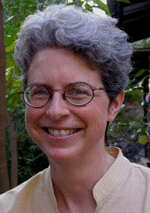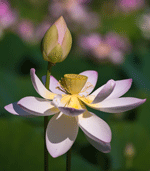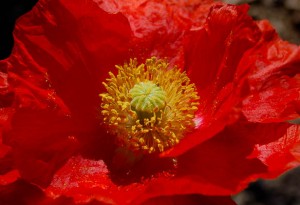Some time before the Buddha was about to die, he gave his disciples a word of encouragement and advice. He said this – and I’m putting it into my own words: “Freedom
from suffering is available to you if you practice by the proper means of mindfulness, but not without having the aspiration to learn and that will bring freedom.”
 Like any undertaking in the world, it is helpful to know why we are doing it. For example, if we exercise we know what our purpose is – to get fit. That is our aspiration. Similarly with our dharma practice. Aspiration is the wholesome wish to free ourselves from suffering by diminishing the unwholesome and strengthening the wholesome qualities of mind. This is our purpose in the dharma.
Like any undertaking in the world, it is helpful to know why we are doing it. For example, if we exercise we know what our purpose is – to get fit. That is our aspiration. Similarly with our dharma practice. Aspiration is the wholesome wish to free ourselves from suffering by diminishing the unwholesome and strengthening the wholesome qualities of mind. This is our purpose in the dharma.
The downfall comes when we misunderstand this word to mean striving and grasping for freedom. This is not aspiration, but the unwholesome aspect of craving, the very source of suffering. Notice the tightness and contractedness in the body when there is craving and how open hearted, light and uplifted the body feels when there is genuine aspiration.
Many of us live busy lives out in the world. We have families, jobs, homes to tend and sometimes we can begin to feel that we have lost touch with the dharma or that we “should” be doing something else to realize our aspiration. Right here we can remind ourselves that our job is to do what the teachings require of us, working with mindfulness in this moment. Anything more than sincerely doing the practice is a hindrance to it’s unfolding. The wondering when, if, how soon and what else we can do to speed up the process – this is all worry and agitation.
So we put it down, relax and simply do the practice right here, there isn’t anywhere else to do it. When we have this deep aspiration for freedom we find the willingness to bring mindfulness to all situations, using what life has offered us as a path to awakening – to stretch and train the heart not to react, but to slowly come to understand what our human existence is all about.

 One of the hardest things for us to learn in meditation is that our practice is not about having certain kinds of experiences. The path is not just about having good feelings or attaining some kind of special, blissful state. It’s actually not about having any particular experience at all. Sometimes of course, we do have powerful experiences in meditation. They may bring energy, inspiration, and serve to bolster our faith. We feel like something is happening, that the practice is “working”. And, ultimately, the path is about freedom in any moment regardless of what’s happening in our experience.
One of the hardest things for us to learn in meditation is that our practice is not about having certain kinds of experiences. The path is not just about having good feelings or attaining some kind of special, blissful state. It’s actually not about having any particular experience at all. Sometimes of course, we do have powerful experiences in meditation. They may bring energy, inspiration, and serve to bolster our faith. We feel like something is happening, that the practice is “working”. And, ultimately, the path is about freedom in any moment regardless of what’s happening in our experience. r efforts. Perhaps we’re hoping to find some ease in the face of life’s inevitable ups and downs. Maybe we want to get enlightened. At times we may feel frustrated or dissatisfied: we’re not getting anywhere; we haven’t gotten any calmer or more peaceful. We fall into evaluating, assessing and judging our practice, looking for evidence of progress. Am I doing it right? Am I getting it? Everyone else seems to be getting it. We judge our experience & then judge ourselves based on our perception of that experience. If we notice this happening, a very useful question to ask is: how am I relating to this experience?
r efforts. Perhaps we’re hoping to find some ease in the face of life’s inevitable ups and downs. Maybe we want to get enlightened. At times we may feel frustrated or dissatisfied: we’re not getting anywhere; we haven’t gotten any calmer or more peaceful. We fall into evaluating, assessing and judging our practice, looking for evidence of progress. Am I doing it right? Am I getting it? Everyone else seems to be getting it. We judge our experience & then judge ourselves based on our perception of that experience. If we notice this happening, a very useful question to ask is: how am I relating to this experience? One of the most prevalent and pervasive ways that the deeply rooted habit of conceit, the ‘conceit of self’, binds us and is perpetuated is through the comparing mind. What a great gift it is to ourself to wake up to seeing that the process of comparing oneself with others perpetuates one’s learned feeling of being deficient or inadequate, or the learned self identification of being better than or the very best. It’s then that we begin to understand one of the primary reasons that we live with an underlying or not so underlying feeling of uncertainty, tension and stress.
One of the most prevalent and pervasive ways that the deeply rooted habit of conceit, the ‘conceit of self’, binds us and is perpetuated is through the comparing mind. What a great gift it is to ourself to wake up to seeing that the process of comparing oneself with others perpetuates one’s learned feeling of being deficient or inadequate, or the learned self identification of being better than or the very best. It’s then that we begin to understand one of the primary reasons that we live with an underlying or not so underlying feeling of uncertainty, tension and stress.

 spontaneously, effortlessly, for just a moment. This actually happens to us more than we realize, but it’s like the air we breathe: we don’t notice it. Typically we get a split second of knowing what is happening, and then we start thinking about what we noticed, or planning about it, or remembering something we did yesterday that was similar to what we’re doing now. We usually simply use awareness to navigate our lives. We have an experience: the water is hot, we know it is hot, and we jerk our hand out. We notice a stain the linoleum, so we go down to clean it. We use the recognition of what is going on to plan, to further our lives. We rarely recognize the quality of
spontaneously, effortlessly, for just a moment. This actually happens to us more than we realize, but it’s like the air we breathe: we don’t notice it. Typically we get a split second of knowing what is happening, and then we start thinking about what we noticed, or planning about it, or remembering something we did yesterday that was similar to what we’re doing now. We usually simply use awareness to navigate our lives. We have an experience: the water is hot, we know it is hot, and we jerk our hand out. We notice a stain the linoleum, so we go down to clean it. We use the recognition of what is going on to plan, to further our lives. We rarely recognize the quality of experience feels when you know that you are aware. Over time, you will begin to recognize the feeling of awareness. As you become familiar with this feeling, you will notice yourself coming back into mindfulness many, many times throughout the day. In the midst of an activity, you will suddenly recognize that you are aware of what is happening. You might be reaching for something, walking across the street, finishing a meal, or driving the car. Appreciating these moments creates the conditions for you to recognize these moments even more frequently.
experience feels when you know that you are aware. Over time, you will begin to recognize the feeling of awareness. As you become familiar with this feeling, you will notice yourself coming back into mindfulness many, many times throughout the day. In the midst of an activity, you will suddenly recognize that you are aware of what is happening. You might be reaching for something, walking across the street, finishing a meal, or driving the car. Appreciating these moments creates the conditions for you to recognize these moments even more frequently. Of course, it’s true that mindfulness holds the presently arising moment with an attitude of non-judgment. In order to learn we have to bear with undesirable experience without condemning— and desirable experience without becoming fixated. Condemnation and fixation are kinds of judgments we make about what is worth experiencing.
Of course, it’s true that mindfulness holds the presently arising moment with an attitude of non-judgment. In order to learn we have to bear with undesirable experience without condemning— and desirable experience without becoming fixated. Condemnation and fixation are kinds of judgments we make about what is worth experiencing. Upekkha in the Pali spiritual language (the language that the Buddha’s original teachings were first transcribed into) is a powerful force in our practice, a powerful force in the whole of our life. It manifests as the equipoise, the balance or equilibrium between the opposing forces in the mind of the desired and the undesired. The equipoise of equanimity offsets the weightiness of greed and aversion. It’s that point of balance in the middle of the see-saw of life.
Upekkha in the Pali spiritual language (the language that the Buddha’s original teachings were first transcribed into) is a powerful force in our practice, a powerful force in the whole of our life. It manifests as the equipoise, the balance or equilibrium between the opposing forces in the mind of the desired and the undesired. The equipoise of equanimity offsets the weightiness of greed and aversion. It’s that point of balance in the middle of the see-saw of life. Patience is required in performing acts of generosity, in observing precepts, and in the field of mental development (bhavana). In meditation when we observe a pain that is gradually intensifying we tend to get annoyed. This annoyance may easily turn into irritation and restlessness. We start fidgeting, we change our posture. We might even ask ourselves: Why do we have to sit still in meditation and observe this pain? This seems like a futile exercise. With this we have just missed a wonderful opportunity to gain intuitive wisdom. If we were to observe that same pain with some patience we could learn many things from it, such as seeing its inherent quality, its fascinating changes, and even its eventual dissolution. When we are remembering some undesirable event of the past we may want to push it away and rather not observe it. Once again, wisdom cannot arise. Here, too, patience will make a big difference. When we accept and observe the undesirable event of the past as an object of observation we get to know it, what it feels like in the mind, and eventually we might even come to terms with it.
Patience is required in performing acts of generosity, in observing precepts, and in the field of mental development (bhavana). In meditation when we observe a pain that is gradually intensifying we tend to get annoyed. This annoyance may easily turn into irritation and restlessness. We start fidgeting, we change our posture. We might even ask ourselves: Why do we have to sit still in meditation and observe this pain? This seems like a futile exercise. With this we have just missed a wonderful opportunity to gain intuitive wisdom. If we were to observe that same pain with some patience we could learn many things from it, such as seeing its inherent quality, its fascinating changes, and even its eventual dissolution. When we are remembering some undesirable event of the past we may want to push it away and rather not observe it. Once again, wisdom cannot arise. Here, too, patience will make a big difference. When we accept and observe the undesirable event of the past as an object of observation we get to know it, what it feels like in the mind, and eventually we might even come to terms with it. Whether it be the spontaneity of a moment to moment creative visceral response through the moving body, or seeing with the eye without interposing the ‘self’, meaning contacting things directly… letting the hand and pencil follow what the eye sees without the thought of ‘making’ a picture or ‘being’ creative…or trusting thoughts/words arising as though from nowhere, from no-one… allowing the immediacy and spontaneity of writing to flow from this ’empty space’–we could say that the creative process is about forgetting what we’ve previously learned which is a necessary step in responding and seeing more directly and precisely.
Whether it be the spontaneity of a moment to moment creative visceral response through the moving body, or seeing with the eye without interposing the ‘self’, meaning contacting things directly… letting the hand and pencil follow what the eye sees without the thought of ‘making’ a picture or ‘being’ creative…or trusting thoughts/words arising as though from nowhere, from no-one… allowing the immediacy and spontaneity of writing to flow from this ’empty space’–we could say that the creative process is about forgetting what we’ve previously learned which is a necessary step in responding and seeing more directly and precisely. My continuing passion is to part a curtain — that invisible veil of indifference that falls between us and that blinds us to each other’s presence, each other’s wonder, each other’s human plight.” — Eudora Welty, American author and photographer
My continuing passion is to part a curtain — that invisible veil of indifference that falls between us and that blinds us to each other’s presence, each other’s wonder, each other’s human plight.” — Eudora Welty, American author and photographer suffering.” The practice of compassion asks us to gently maintain our awareness of suffering. Most of us are strongly habituated to sweep discomfort away, to sweep dis-ease “under the rug“, to hide it away in a metaphoric closet. Or, we hide ourselves away by shutting off, going to sleep or distracting ourselves. We might ignore or trivialize suffering so we don’t see the pain of others in the world — or experience our own pain and suffering.
suffering.” The practice of compassion asks us to gently maintain our awareness of suffering. Most of us are strongly habituated to sweep discomfort away, to sweep dis-ease “under the rug“, to hide it away in a metaphoric closet. Or, we hide ourselves away by shutting off, going to sleep or distracting ourselves. We might ignore or trivialize suffering so we don’t see the pain of others in the world — or experience our own pain and suffering.